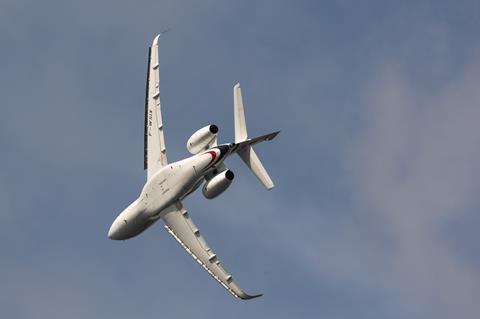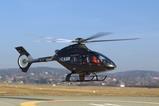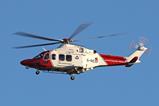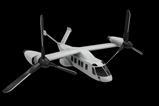European certification of the Dassault Aviation Falcon 6X is imminent, with achievement of the milestone “a question of a few days”, says the airframer’s chief executive.
Briefing journalists on the manufacturer’s half-year performance on 20 July, Eric Trappier said the approval process was now simply a matter of finalising the paperwork for the ultra-wide-cabin business jet.

“We hope it will happen this summer,” he adds. “We have been waiting for this for quite a number of weeks now.”
Production of the jet – which took part in the flying display at June’s Paris air show – is ramping up and once European Union Aviation Safety Agency validation is received “we will commission this aircraft and begin deliveries to our first clients”, says Trappier.
Dassault will operate its own demonstrator aircraft, allowing potential clients to experience the twinjet in flight. “This will definitely boost sales of the 6X,” he adds.
Work on the ultra-long-range Falcon 10X is also in full swing as the airframer battles to maintain its 2025 service-entry target.
“Development of the Falcon 10X is ongoing (the detailed technical specification phase has been completed) and we are now in the industrialisation and early manufacturing phase,” says Dassault.
During the first half, the company took in 12 orders for Falcons and handed over nine aircraft, down on respective figures of 44 and 14 in the same period a year earlier. Dassault expects to deliver 35 aircraft over the course of the full year.
Trappier says the market began slowing at the end of 2022, with that trend continuing this year.
Its business jet backlog stands at 90 units, up slightly on the 87 aircraft recorded at the end of 2022.
Meanwhile, Dassault is considering legal action, on equality grounds, to challenge the EU’s exclusion of business aviation from its list of sectors qualifying for sustainability-related investment despite its progress on decarbonisation.
“In the United States, industries are receiving subsidies and making rapid progress; Europe is putting less money on the table and imposing standards,” says the airframer. Trappier accuses the EU of being in “hyper-regulation mode” and that its unilateral approach ignores the global nature of aviation.































